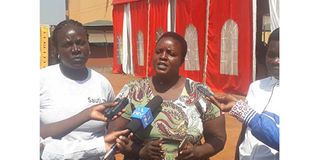Remove hurdles women face in cross-border trade, AU told

Officials of the cross-border women traders Sacco speak in Busia on June 26, 2019. Femnet has accused African heads of state of slow and shifty implementation of affirmative action.
What you need to know:
- Femnet is calling for the removal of non-tariff barriers, creation of financial policies that are responsive to women and linkage between trade, and for peace and security in fragile states.
- Informal and cross-border trade accounts for 70 per cent of the economy in sub-Saharan Africa, and is a source of income for 43 per cent of Africa’s population.
Women’s development partners in Africa want heads of state to address the challenges facing female cross-border traders as they meet in Addis Ababa to discuss intra-African trade.
The African Women's Development and Communications Network (Femnet) accused the heads of state of slow and shifty implementation of affirmative action, despite showing a promising political will.
It is calling for the removal of non-tariff barriers, creation of financial policies that are responsive to women and linkage between trade, and for peace and security in fragile states.
“We must address all the trade barriers to realise the change that we have been demanding for so long. Our words are not just mere sentiments for people to react to whenever it is convenient,” said Femnet Executive Director Memory Kachambwa.
Informal and cross-border trade accounts for 70 per cent of the economy in sub-Saharan Africa, and is a source of income for 43 per cent of Africa’s population. Women constitute 70 per cent of the informal cross-border traders.
The African Continental Free Trade Area (AfCFTA) is designed to boost intra-African trade by up to 52.3 per cent and it is expected to expand Africa’s economy to $29 trillion dollars by 2050.
Kachambwa insisted that the AfCFTA must look at the socioeconomic barriers, which also affect trade. She recommended the establishment of an ecosystem of starts-ups that helps African women to jump-start their businesses with reliable capital.
Lina Asimwe from the Eastern African Sub-Regional Support Initiative observed that women in unstable borders often seek alternative routes to ply their trade at the risk of sexual harassment and violence.
And when such incidents happen, it becomes hard to track and take legal actions against perpetrators since most tend to be militias of vigilantes armed to cater for the interest of warlords in control of these borders.
Asimwe challenged the AU heads to consider peace, reconciliation and justice as a key component that would facilitate the free movement of trade, as they remain a constraint to women traders across borders.
Maria Andrea Echaz from the UN Human Rights Office of High Commissioner said inclusion of women and girls in the AfCFTA processes must be central.
She noted that women are still overlooked, despite being a majority of the informal economy, agriculture, and cross-border trade. Most economic policies, she said, are drafted in gender-neutral language, which ignores the differentiated impact on women.
“Policymakers should gather and dis-aggregate data by gender to be able to analyse the impact of the AfCFTA on women, design measures and trade agreements that do not lead to rise in commercial sexual exploitation of girls and child trafficking,” she said.





